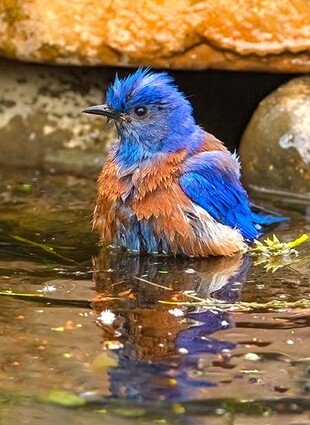Sisters Country birds
Last updated 3/15/2022 at Noon
The Western Bluebirds (sialia mexicana) will soon be returning to Oregon after wintering in California and Mexico.
Dropping from a perch to feed on ground insects or consuming many berries including poison oak, elderberry, and mistletoe, our Western Bluebirds will build their nests in tree cavities or birdhouses. As members of the thrush family the male will begin singing before dawn to mark his breeding territory.
The female gathers fine grasses, needles, feathers, and horsehair and constructs a loose nest where she lays two to eight pale blue to white eggs. Bluebirds may raise two to three broods using the same nest or build another nest. After incubating for 12-17 days, the nestlings will be fed for 18-25 days before leaving their home. Often the Western Bluebird parents have helpers who assist in attending the young and up to 45 percent of the nests contain young that are not the resident male’s offspring.
This species is threatened by habitat loss and degradation. Invasive, non-native plants and lack of fire have adversely affected habitat in many areas. Bluebirds face competition for cavities from non-native birds and heavy predation by house cats, raccoons, and rodents severely affect the population. Birdhouses with the proper entry hole size are essential to maintaining a healthy population.
On their wintering grounds the Western Bluebird will sometimes form flocks of up to 100 with Robins and Mountain Bluebirds mixed within the flocks.
A collection of Western Bluebirds is called a “mutation” or a “hermitage.” For more Western Bluebird photos visit http://abird
singsbecauseithasasong.com/recent-journeys.












Reader Comments(0)